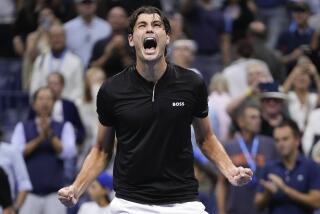Nalbandian Blisters Safin
- Share via
PARIS — Try as he might, Marat Safin of Russia could not stop the French Open from tumbling into numbing normality.
It was in his hands, and that was the problem.
Safin’s hands were covered with blisters and had to be covered with tape. Short of turning him into a mummy, there were limits to what a trainer could do with the tape and other treatments.
On Monday, he simply could not combat twin foes -- blisters and No. 8-seeded David Nalbandian of Argentina. After Nalbandian defeated him, 7-5, 6-4, 6-7 (5), 6-3, in the fourth round, No. 20 Safin was asked which opponent was tougher.
“Both,” he said. “I really suffered. I tried to take care of them. Unfortunately, I couldn’t take my chances and concentrate myself and get into the match. I was always behind. Unfortunately, too many rivals today.”
The rivals numbered about 12, Nalbandian and 11 blisters. In the interview room, Safin counted six on his left hand and five on the right. He was asked whether he thought about trying a glove, like a golfer.
“Next life,” Safin said, smiling.
Safin, who reached the final at the Australian Open in January, resorted to his usual array of tricks to try to stay in contention. He mixed it up, resorting to serve-and-volleying at times, and kept calling the trainer when another blister would open. Nalbandian admitted the frequent breaks were a little annoying, but he managed to keep his concentration.
Nalbandian gave Safin a brief lifeline in the third-set tiebreaker. He was serving at 5-4 when Safin hit a forehand return, which landed just inside the baseline. Although Nalbandian had a play on it, he let the shot go, possibly thinking it was heading long. Safin went on to take the next two points and the set, answering Nalbandian’s drop shot with another drop shot and moving on to the fourth set when Nalbandian netted a forehand return.
That was essentially Safin’s last gasp. The toll of so many long matches in previous rounds -- and the blisters -- started to accumulate in the fourth.
“The last four games, I couldn’t play, I couldn’t hit forehand,” Safin said. “I couldn’t do many things. Every time I had to change the tape. Not much I can say.”
His departure turned the French Open back into a conventional tournament. With Safin around, anything was seemingly capable of occurring, and it did. He dropped his shorts, played consecutive five-set matches and seemed attracted to controversy like a moth to light.
Now the event is on the verge of becoming the South American Open, with the outsiders being No. 5 Carlos Moya of Spain, No. 12 Lleyton Hewitt of Australia and No. 9 Tim Henman of Britain. Hewitt, who beat Xavier Malisse of Belgium, 7-5, 6-2, 7-6 (6), joked about the presence of Henman.
“Another English-speaking guy,” Hewitt said, smiling. “There’s not many guys in the locker room I can talk to.”
Four Argentines are in the quarterfinals -- Nalbandian, Gaston Gaudio, who beat Igor Andreev of Russia, 6-4, 7-5, 6-3 on Monday, No. 3 Guillermo Coria and Juan Ignacio Chela.
“It’s great,” Nalbandian said. “I think never in history it happen, something like this. So I’m a little surprised, because this is not like every day. So I hope ... I hope all the Argentinians meet in the semifinals.”
Previously, the most Argentines to reach the final eight of a Grand Slam event was two, which happened twice. In 1982, Guillermo Vilas and Jose-Luis Clerc did it at the French Open, and Coria and Nalbandian made the quarterfinals at the U.S. Open last year. Nalbandian almost made the final in New York, holding match point against Andy Roddick before falling in five sets.
The lone Brazilian in the group is three-time champion Gustavo Kuerten, who looked formidable in a 6-3, 7-5, 6-4 victory over Feliciano Lopez of Spain. The three-time champion was asked what would be “a greater miracle from the Lord,” Henman winning on clay at Roland Garros or Kuerten winning on grass at Wimbledon.
Kuerten responded with a thoughtful answer. “I think maybe is better to ask them, the people stop to make the war, no?” he said. “Because for us, we have an even tougher time to figure out the way to do it.”
Maybe he’ll draw something else in the clay if he wins here again. The accommodating Kuerten, who outlined a heart on the court the last time he won here in 2001, eventually gave an answer to the question, at least the one that the reporter was attempting to get.
“I think right now he has more of a chance than me, because I don’t think I can do the quarterfinal there [again], and he’s already in the quarterfinal here,” he said of Henman, who will play Chela today in an attempt to reach the final four.
More to Read
Go beyond the scoreboard
Get the latest on L.A.'s teams in the daily Sports Report newsletter.
You may occasionally receive promotional content from the Los Angeles Times.











